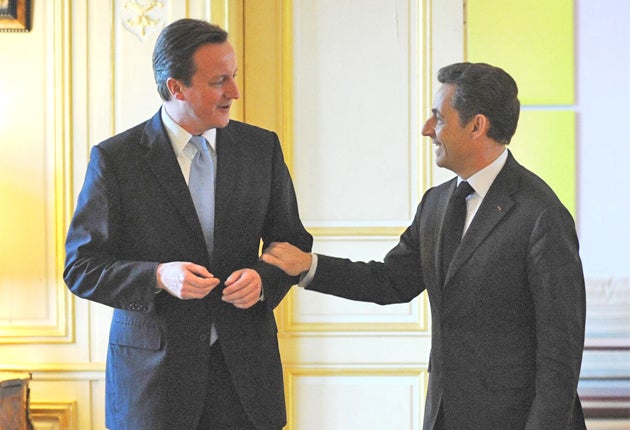Cameron faces his first EU challenge: to avoid a row in Brussels
Budget reforms could cause tension with Lib Dem partners

David Cameron will defy pressure today for Britain to be included in European measures to increase economic co-operation, aimed at preventing a repeat of the crisis in Greece.
Attending his first EU summit since becoming Prime Minister, he will argue that plans to give the European Commission greater powers to supervise the budgets of member states should be restricted to the 16 countries in the eurozone. The plans include imposing penalties such as withdrawal of EU voting rights for countries that breach EU budgetary guidelines.
Although the French President, Nicolas Sarkozy, agrees that any such checks should be restricted to the eurozone, there are growing demands for them to apply to all 27 member states including Britain. This view is being pushed by Angela Merkel, the German Chancellor, and Herman van Rompuy, President of the European Council – the 27 national leaders meeting in Brussels.
Worryingly for Mr Cameron, some Scandinavian and eastern European countries, which do not want to end up in the outer group of a "two-tier Europe", want the tougher rules and sanctions to apply to all member states.
"That would be a big problem for us," one British source said. "We are happy for others to go ahead and that might be a good thing. But it should be a matter for the eurozone alone. We are not going to be dragged into it."
The latest push for EU integration could become a major headache for Mr Cameron. The reforms could involve changing the EU's governing treaties, putting his Government under intense pressure to honour its promise to hold a referendum before any new powers are transferred to Brussels. Many Tory MPs are Eurosceptic and determined to press for a Europe referendum at any opportunity because Mr Cameron denied them one on the Treaty of Lisbon. This could cause tension between the Tories and their coalition partners, the pro-EU Liberal Democrats.
There was better news for Mr Cameron on another front yesterday. He is likely to avoid a row over demands to submit his Government's Budget proposals to Brussels for approval before they are formally announced in London.
The proposal is expected to be watered down, with the summit's declaration saying the move would take account of "national budgetary procedures". This could allow the British Government to submit its pre-Budget report, after it is published in November or December, without having to send the Budget before it is presented in March or April.
The wrangling over the EU's "economic governance" could jeopardise Mr Cameron's attempt to strike a positive tone in his debut on the European stage. "We don't want a row; it's up to others whether they drag us into one," one British official said. So far, the new Government has worked hard to allay fears in EU capitals that Britain would have its most Eurosceptic government since Margaret Thatcher if he became Prime Minister.
Alarm bells rang after Mr Cameron withdrew Tory MEPs from the mainstream centre-right group, the European People's Party, in the European Parliament, to which Mr Sarkozy's and Ms Merkel's parties belong. The Tories formed a sceptic group, the European Conservatives and Reformists, dismissed as "nutters, homophobes and anti-Semites" by Nick Clegg, the Liberal Democrat leader who is now Deputy Prime Minister. Today Mr Cameron may have a brief meeting with the group's leader, the controversial right-wing Polish MEP Michal Kaminsky, but it is likely to be a low-key affair.
EU diplomats have been pleasantly surprised by the positive and constructive noises on Europe coming from Mr Cameron and William Hague, the Foreign Secretary, who fought the 2001 general election on a Eurosceptic ticket when he was Tory leader. Some EU officials attribute the positive tone to the influence of the Liberal Democrats and Mr Clegg, a former MEP and Commission official, who visited Berlin and Madrid last week in another sign of the Government's positive intentions.
However, Tory insiders suggest that Mr Cameron would have adopted the same positive and pragmatic approach to Europe even if he had won an overall majority last month. "We have given him the excuse to ditch his Eurosceptics," quipped one Liberal Democrat. "He can blame it on us."
Join our commenting forum
Join thought-provoking conversations, follow other Independent readers and see their replies
Comments
Bookmark popover
Removed from bookmarks